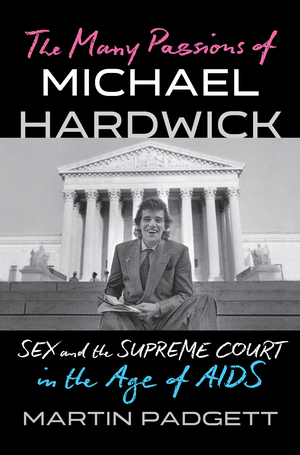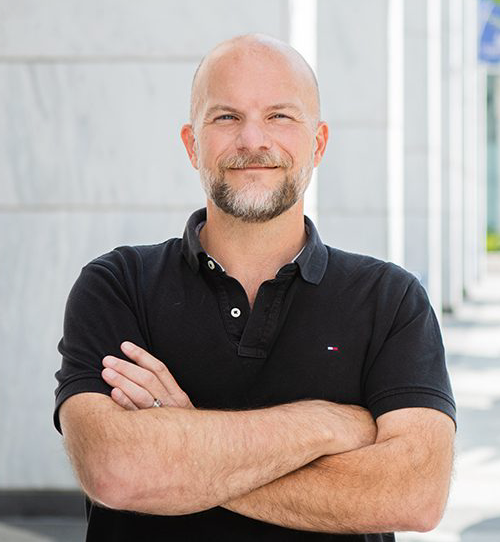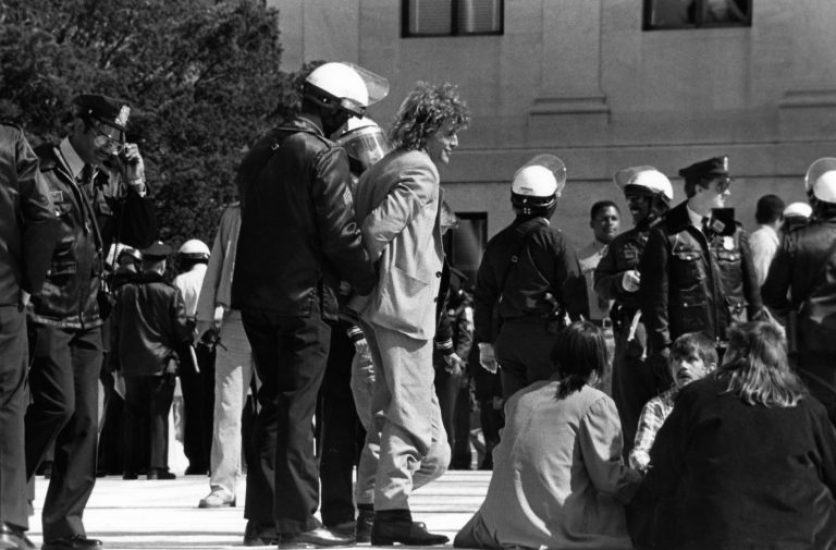‘History Unfolding’: Author Martin Padgett on Why Michael Hardwick’s Story is More Important Than Ever
“The Many Passions of Michael Hardwick: Sex and the Supreme Court in the Age of AIDS” author Martin Padgett’s fascinating, deeply researched new book sheds fresh light on a pivotal figure in American LGBTQ+ history. An Atlantan, Hardwick was the Midtown bartender and visual artist at the center of the landmark 1986 Bowers v. Hardwick Supreme Court ruling, which essentially established “a separate tier of law” for queer people engaging in homosexual sex. On August 3, 1982, Atlanta Police officer Keith R. Torick walked into Michael Hardwick’s Ponce de Leon Place bedroom while he was engaged in consensual oral sex with a partner and arrested both men for sodomy and possession of a quarter ounce of marijuana. The case eventually made its way to the Supreme Court. In its 5-4 majority opinion on June 30, 1986, the court ruled to uphold Georgia’s sodomy law. In his concurring opinion Chief Justice Warren E. Burger wrote, “To hold that the act of homosexual sodomy is somehow protected as a fundamental right, would be to cast aside millennia of moral teaching.” The ruling flipped the script on the court’s own 1965 ruling in Griswold v. Connecticut, which held that a right to privacy was implicit in the U.S. Constitution’s 14th Amendment. In 2003, the Bowers v. Hardwick ruling was finally overturned by SCOTUS in the subsequent Lawrence v. Texas case. Michael Hardwick, who died of AIDS in 1991, never lived to see it.

Padgett’s illuminating new examination of Hardwick’s life, legacy and landmark queer activism feels especially prescient right now, given Justice Clarence Thomas’ concurring opinion in the court’s 2022 Dobbs ruling, which overturned Roe v. Wade and abortion rights in America. In his opinion, Thomas stated that Lawrence v. Texas, Griswold v. Connecticut and 2015’s Obergefell v. Hodges ruling, which legalized gay marriage in America should all be reconsidered by the court’s current conservative super majority.
As Atlantans prepare for the city’s 55th annual Pride celebration this weekend, Oct. 11 and 12, Padgett will appear in conversation with Claire Haley Wednesday night Oct. 8 at 7 at the Atlanta History Center’s Margaret Mitchell House in Midtown to discuss his new book and what is currently at stake for LGBTQ+ Americans during Donald Trump’s second term. Says Padgett: “This feels like the most tumultuous time I’ve ever lived in as an American.”
Prior to his visit back to the city where he spent time doing research for “The Many Passions of Michael Hardwick,” Padgett spoke with Eldredge ATL about what motivated his dig into 40 years of queer history, why Michael Hardwick’s story matters more than ever and the red flags he sees on the horizon for LGBTQ+ rights in America. The following is a version of that conversation, edited for clarity and length.
What attracted you to Michael Hardwick’s story? In this book and in your 2021 set-in-Atlanta “A Night at the Sweet Gum Head,” you’re placing a long overdue spotlight on people and events that have been largely dimmed by time and the AIDS epidemic.
And also by recent history. The thing that appealed to me about finding out more about Michael’s story is that it’s placed in approximately the same time frame, with a lot of the same people and same places I was familiar with [as the Sweet Gum Head book]. But also we feel, or rather felt, since Obergefell, that our rights were consolidated, enshrined and that’s probably not the case. So I thought, ‘Let’s go back to a time when our rights were not set in stone.’ In fact, there was a perfect right to discrimination based on the Supreme Court’s decisions. [“The Many Passions of Michael Hardwick”] is about the kind of action it takes and the kind of person it takes to stand up for us. And to be a name and a face for a case like this. Unfortunately, I think we are needing that again now. The Supreme Court wants to create a separate tier of law for people they don’t understand.

When you ink a deal with a major publisher, your book release is really left up to the whims of the company’s schedule. But this book coming out five months into the second Trump administration doesn’t get much more timely, does it?
A: When I pitched this book to my editor, I said, ‘I think I really want this out in Oct. of 2024 because the election will be rolling up and people have a decision to make and this is relevant information that could be very important to people.’ And she said, ‘Unfortunately, I think we’re going to be facing these issues long after that.’
Q: This brings Michael Hardwick’s story to the forefront in a three-dimensional way, perhaps for the first time. On your book tour, what are people saying to you now that they have a fuller grasp of Michael and his case?
A: So many people who are younger than me just had no idea about his case. So many people have grown up now in the last 10 years with Obergefell as settled law, with their rights ensconced. A lot of people were shocked that this happened so recently. Historically, where we always run into problems as a democracy is when we don’t want to honor each person’s rights and we purposely put certain people aside and claim they’re not a part of the “real America.”
I hadn’t read the Bowers v. Hardwick decision since it was first issued almost 40 years ago. Essentially, the ruling states homosexuals shouldn’t enjoy the same freedoms and the same right to privacy as heterosexuals. Was is as jarring for you as it was for me to see that the case was decided almost exclusively on moral and Christian biblical grounds?
After the case was decided, [Justice] Harry Blackmun said that [Justice] Byron White’s [majority] opinion was one of the worst he had ever read because it simply said, ‘This is how I think the law should be, so that’s how it is.’ What a scary precursor to how the current Supreme Court has operated, maybe since Shelby [County v. Holder] in 2013, the Voting Rights Act decision that stripped half of the Act’s provisions out of it. They’re really flying by the seat of their Heritage Foundation pants and the rest of us are suffering for it. This is long-term damage that will take generations to unwind, if we’re able to do it.
For Atlantans, one of the most powerful things about “Many Passions” is you take readers inside Michael’s bedroom at 811 Ponce de Leon Place on August 3, 1982 as an Atlanta cop silently walks into the bedroom, observes what is going on and then arrests Hardwick and his sexual partner on sodomy charges. Did Atlanta Police still have the arrest records on file?

No. I went to multiple places trying to get arrest records and mugshots. Even the ACLU didn’t have its paperwork since it had all been donated to the University of Georgia archives. I finally found a WXIA-TV news reel in the Vanderbilt University video archives of television news. That had stills of Hardwick’s mugshots. Even more significant, there’s a note in Michael’s own handwriting that had been kept. The ACLU asked him to write down everything that happened in and around the incidents. It’s a five-page handwritten document and there was a copy in a law professor’s archive. I learned about this during Covid. Two years later when she was able to get back to her office, she sent me the copies she’d held onto for 35 years. Seeing how Michael got angry, written in his own hand was powerful. Being able to see his handwriting as it got progressively bigger and angrier as he wrote the statement felt like a moment when you can see history unfolding.
In the epilogue of your book you don’t hold back laying out the realities of these times for queer Americans. In his concurring Dobbs opinion, Justice Thomas explicitly stated that Griswold, Lawrence v. Texas and Obergefell are all fair game for reconsideration. What message are you hoping to leave readers with?
It’s never too late to organize or to begin to consider what the next version of the Supreme Court could look like. But we also need to realize that it takes a [congressional] supermajority during an election cycle for us to have the kind of power to tackle that kind of reform. President Biden didn’t have that. I hope that with both of my books, I’ve been able to show that queer history doesn’t only operate at the coasts and that vital, important things are happening in places like Atlanta.
“The Many Passions of Michael Hardwick: Sex and the Supreme Court in the Age of AIDS” (Norton, $31.99) is available now. Author Martin Padgett will be in conversation with Claire Haley, Wed. Oct. 8 at 7 p.m. at the Atlanta History Center’s Margaret Mitchell House in Midtown, followed by a signing. For tickets and more info, please visit AHC’s events page.
Above photo: Michael Hardwick’s 1987 arrest at a Supreme Court protest where 600 people were arrested. Photo from “The Many Passions of Michael Hardwick.”

Richard L. Eldredge is the founder and editor in chief of Eldredge ATL. As a reporter for the Atlanta Journal-Constitution and Atlanta magazine, he has covered Atlanta since 1990.




